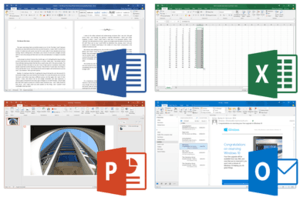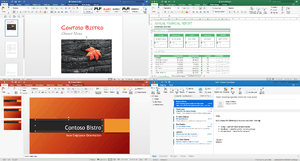Microsoft Office 2016
|
| |
|
| |
| Developer(s) | Microsoft |
|---|---|
| Initial release | 22 September 2015[1] |
| Stable release |
1610 (Build 7466.2038)
/ 10 November 2016[2] |
| Development status |
Mainstream support ends on 13 October 2020. Extended support ends on 14 October 2025.[3] |
| Operating system | Windows 7 SP1 or later[4] |
| Platform | IA-32, x64 |
| Available in | 102 languages[5] |
|
List of languages
| |
| Type | Office suite |
| License | Trialware |
| Website |
products |
|
| |
| Developer(s) | Microsoft |
|---|---|
| Initial release | 9 July 2015[6] |
| Stable release |
15.28.0
/ 15 November 2016[7] |
| Development status | Mainstream support ends on 13 October 2020. |
| Operating system | OS X Yosemite or later[4] |
| Platform | x64[8] |
| Available in | 16 languages[9] |
|
List of languages English, Chinese (Simplified), Chinese (Traditional), Danish, Dutch, Finnish, French, German, Italian, Japanese, Norwegian (Bokmål), Polish, Portuguese (Brazil), Russian, Spanish, Swedish | |
Microsoft Office 2016 (codenamed Office 16) is a version of the Microsoft Office productivity suite, succeeding both Office 2013 and Office for Mac 2011. It was released on macOS on 9 July 2015 and on Microsoft Windows on 22 September 2015 for Office 365 subscribers.[6][10][11] Mainstream support ends on 13 October 2020, and extended support ends on 14 October 2025, the same time as Windows 10. The perpetually licensed version on macOS and Windows was released on 22 September 2015.[12]
New features
Windows
New features in the Windows release include the ability to create, open, edit, and save files in the cloud straight from the desktop, a new search tool for commands available in Word, PowerPoint, Excel and Outlook named "Tell Me", more "Send As" options in Word and PowerPoint, and co-authoring in real time with users connected to Office Online.[13][14][15] Other smaller features include Insights, a feature powered by Bing to provide contextual information from the web, a Designer sidebar in PowerPoint to optimize the layout of slides, new chart types and templates in Excel (such as treemap, sunburst chart (also known as a ring chart), waterfall chart, box plot and histogram, and financial and calendar templates), new animations in PowerPoint (such as the Morph transition), the ability to insert online video in OneNote, and a data loss prevention feature in Word, Excel, and PowerPoint.[14][15]
Microsoft Office 2016 cannot coexist with Microsoft Office 2013 apps, but it can coexist with earlier versions of Microsoft Office, such as 2003, 2007, and 2010.[16] Microsoft offers to freely replace these older 2013 versions with an updated version.[17]
Mac
New features in the Mac release include an updated user interface that uses ribbons, full support for Retina Display, and new sharing features for Office documents.[11][18]
In Word, there is a new Design tab, an Insights feature, which is powered by Bing, and real-time co-authoring. In Excel, there is a Recommended Charts feature, and PivotTable Slicers. In PowerPoint, there are theme variants, which provide different color schemes for a theme. In Outlook, there is a Propose New Time feature, the ability to see calendars side by side, and a weather forecast in the calendar view.[18]
Outlook 2016 for Mac has very limited support for synchronization of collaboration services outside of basic email.[19]
With version 15.25, Office for Mac transitioned from 32-bit to 64-bit by default.[20] Users that require a 32-bit version for compatibility reasons will be able to download the 15.25 version as a one-time update manually from the Microsoft Office website.[21] All versions following 15.25 will be 64-bit only.[21]
Editions
Traditional editions
As with previous versions, Office 2016 is made available in several distinct editions aimed towards different markets. All traditional editions of Microsoft Office 2016 contain Word, Excel, PowerPoint and OneNote and are licensed for use on one computer.[22][23]
Five traditional editions of Office 2016 were released for Windows:
- Home & Student: This retail suite includes the core applications only.[22]
- Home & Business: This retail suite includes the core applications and Outlook.[22]
- Standard: This suite, only available through volume licensing channels, includes the core applications, as well as Outlook and Publisher.[24]
- Professional: This retail suite includes the core applications, as well as Outlook, Publisher and Access.[22]
- Professional Plus: This suite, only available through volume licensing channels, includes the core applications, as well as Outlook, Publisher, Access and Skype for Business.[24]
Three traditional editions of Office 2016 were released for Mac:
- Home & Student: This retail suite includes the core applications only.[23]
- Home & Business: This retail suite includes the core applications and Outlook.[23]
- Standard: This suite, only available through volume licensing channels, includes the core applications and Outlook.[24]
Office 365
The Office 365 subscription services, which were previously aimed towards business and enterprise users, were expanded for Office 2016 to include new plans aimed at home use. The subscriptions allow use of the Office 2016 applications by multiple users using a software as a service model. Different plans are available for Office 365, some of which also include value-added services, such as 1 TB of OneDrive storage and 60 Skype minutes per month on the Home Premium plan.
Design
The user interface design of Office 2016 for Windows is relatively unchanged from its predecessor, Microsoft Office 2013. It retains the flat design that was introduced along with the Metro design language, albeit a few modifications to the layout are made, in order to conform with the design of Microsoft Office Mobile.[25] When Office 2016 was released, it came with three themes. The default theme, known as "colorful", features a solid colour on the top band of the ribbon, corresponding to the colour of the Office application being used, for example, a solid dark blue is featured prominently in Microsoft Word. The theme had been described as useful in making the tab headings more distinct.[26] In addition, both the "white" and "dark grey" themes from Office 2013 are available as well, though, no new backgrounds have been added, nor existing backgrounds removed.[26] A fourth "Black" color theme was added as part of an update in January 2016.[27]
Updates
November update
Microsoft began rolling out an Office 2016 "November update" to Office Insiders on Windows on 3 December 2015. The update was originally planned to be released alongside the Windows 10 November update, but was delayed. The update includes new features for Word 2016, Excel 2016, PowerPoint 2016, and OneNote 2016, and was released to Office 365 Current Channel users on 9 December 2015.[15][28] The update was not released to users of the traditional editions.[15]
See also
References
- ↑ White, Julia (10 September 2015). "Admins—get ready for Office 2016, rollout begins September 22!". Microsoft.
- ↑ "Office 365 client update branch releases". TechNet. Microsoft. Retrieved 12 January 2016.
- ↑ "Microsoft® Support Ending Dates for Retail/OEM Consumer/SOHO Operating Systems and Front Office Software". allyncs.com. Retrieved 31 December 2015.
- 1 2 "System requirements for Office 2016". Microsoft. 22 September 2015. Retrieved 24 September 2015.
- ↑ "Language Accessory Pack for Office 2016". Office.com. Microsoft. Retrieved 25 February 2016.
- 1 2 Warren, Tom (4 May 2015). "Microsoft one-ups Google Docs with real-time editing in Office 2016". The Verge. Vox Media.
- ↑ "MS16-133: Description of the security update for Office 2016 for Mac: November 15, 2016". Microsoft. 15 November 2016. Retrieved 15 November 2016.
- ↑ "Older 64-bit Macs out of the picture for Mountain Lion". CNET. CBS Interactive. 11 July 2012. Retrieved 28 September 2015.
- ↑ "Office for Mac 2016 in 16 languages". Microsoft. 5 March 2015. Retrieved 26 September 2015.
- ↑ Steele, Billy (22 January 2015). "Office 2016 will hit desktops later this year". Engadget. AOL.
- 1 2 Koenigsbauer, Kirk (9 July 2015). "Office 2016 for Mac is here!". Office Blogs. Microsoft. Retrieved 9 July 2015.
- ↑ Koenigsbauer, Kirk (22 September 2015). "The new Office is here". Office Blogs. Microsoft. Retrieved 22 September 2015.
- ↑ Popa, Bogdan (4 May 2015). "New Office 2016 for Windows Desktop Public Preview Available for Download". Softpedia. SoftNews.
- 1 2 Spataro, Jared (4 May 2015). "Office 2016 Public Preview now available". Office Blogs. Microsoft. Retrieved 5 May 2015.
- 1 2 3 4 "Office 2016's November update finally rolls out to early testers". PCWorld. Retrieved 4 December 2015.
- ↑ "Install and use different versions of Office on the same PC". Microsoft. Retrieved 2016-07-05.
- ↑ ""We need to remove some older apps" error". Office.com. Microsoft.
- 1 2 "What's New in Office 2016 for Mac". Office. Microsoft. Retrieved 25 August 2015.
- ↑ "Compare Outlook 2016 for Mac with Outlook 2016 for Windows". TechNet. Microsoft. 3 September 2015.
- ↑ "Insider Fast: Our initial 64-bit release of Office 2016 for Mac is - Microsoft Community". Microsoft. Microsoft. 1 July 2016.
- 1 2 "Office 2016 for Mac 64-bit upgrade". Microsoft. Microsoft. 23 August 2016.
- 1 2 3 4 "Choose Microsoft Office Products". Office. Microsoft. Retrieved 2 October 2015.
- 1 2 3 "Choose Microsoft Office Products". Office. Microsoft. Retrieved 2 October 2015.
- 1 2 3 "Compare Microsoft Office Volume Licensing Suites". Office. Microsoft. Retrieved 2 October 2015.
- ↑ Warren, Tom (16 March 2015). "Microsoft Office 2016 includes a colorful new theme". The Verge. Vox Media. Retrieved 14 August 2015.
- 1 2 Anderson, Tim (18 March 2015). "Delving into Office 2016: Microsoft goes public with new preview". The Register. Situation Publishing. Retrieved 14 August 2015.
- ↑ "What's New and Improved in Office 2016 for Office 365 - Office Support". support.office.com. Retrieved 4 March 2016.
- ↑ "What's New and Improved in Office 2016 for Office 365 - Office Support". support.office.com. Retrieved 4 December 2015.


